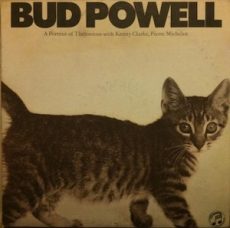
Requisites
Bud Powell – A Portrait of Thelonious | By Eddie Carter
Submitted for your approval this morning is an underrated, yet excellent 1965 trio album by pianist Bud Powell. A Portrait of Thelonious (Columbia CL 2292/CS 9092) is a wholehearted tribute to Thelonious Monk, one of the most influential figures in jazz. Pierre Michelot joins him on bass, and Kenny Clarke is on drums. Together, this trio of giants captures the spirit, complexity, and emotional depth of four Monk compositions, one standard and three little- known originals, as seen through Powell’s interpretations. The chemistry between the musicians yields a dynamic exploration of Monk’s repertoire, rendering the album both a reverent homage and a fresh reimagining of the jazz piano tradition. My copy of this album is the 1980 U.S. Columbia Jazz Odyssey Series stereo reissue (PC 36085).
Monk’s Off Minor opens the first side at a medium beat for the friendly melody. Bud is the featured soloist and glides through an enchanting performance with Pierre and Kenny providing a crisp, driving foundation right up to the song’s finish. There Will Never Be Another You by Mack Gordon and Harry Warren is a joyous interpretation that the trio brings to life with a playful spirit during the theme, which is sure to bring a smile to the listener’s face. Again, Powell is the lone soloist and provides a leisurely presentation, possessing a carefree zest that’s consistently rewarding, leading to the theme’s reprise and climax.
Thelonious Monk created some of jazz’s most memorable standards, and Ruby, My Dear is one of his most beautiful compositions, named for his first love, Rubie Richardson. The trio opens with a delicate melody. Bud presents a haunting, poignant performance, marked by gentle sensitivity, layered over the warm, supportive accompaniment of Pierre and Kenny, ahead of a gorgeous conclusion. No Name Blues by Earl Bostic is a catchy tune that begins with the trio’s effective medium-tempo beat for the theme. Powell’s lead solo is an ear-pleaser that swings comfortably into Michelot’s relaxing performance, fueled by Clarke’s brushwork preceding the trio’s bouncy closing chorus.
Thelonious is another of Monk’s inventive melodic ideas from 1947, like Off Minor and Ruby, My Dear. The trio immediately grabs the listener with a catchy hook and a solid medium-tempo groove during the introduction and theme. Powell swings effortlessly in the song’s only solo before the ensemble’s reprise and ending. Monk’s Mood is a pretty ballad by Thelonious Monk that’s luxurious yet straightforward. Powell has the solo spotlight to himself and delivers a gorgeous performance of beauty, elegance, and affectionate warmth, while Michelot and Clarke keep close preceding the song’s peaceful conclusion.
The beat moves upward for I Ain’t Foolin’ by Charles Albertine next. It’s a toe-tapper from the start of the ensemble’s bubbly introduction and melody. Bud navigates the tune’s lively structure in a spirited performance blending bebop lines and Monk-inspired blues inflections until the theme’s restatement and exit. Squatty by Brian Fahey concludes the album, with Clarke setting the tone ahead of the trio’s infectious groove on the melody. Powell establishes a relaxed rhythm, inviting listeners to unwind during the first solo. Michelot steps forward next with a concise reading of lively notes before the trio’s finale.
Julian “Cannonball” Adderley produced A Portrait of Thelonious, and it’s unknown who the original engineer was.Arthur Kendy was behind the dials of the reissue. The album’s sound quality across the highs, midrange, and bass is superb, placing the musicians in your listening room. Each instrument is captured with remarkable clarity, and the balanced mix highlights the interplay between the trio, making every note feel immediate and intimate. If you’re seeking a superb piano trio album for your library, I enthusiastically invite you to check out A Portrait of Thelonious by Bud Powell on your next record shopping trip. It’s an excellent introduction to his music that’s sure to become a welcome addition to any fan’s library who appreciates piano jazz!
~ There Will Never Be Another You – Source: JazzStandards.com ~ Off Minor, Ruby, My Dear, Thelonious – Source: Wikipedia.org © 2025 by Edward Thomas CarterMore Posts: choice,classic,collectible,collector,history,instrumental,jazz,music,piano
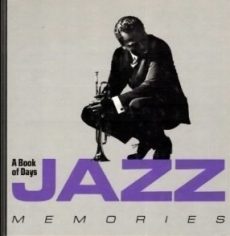
On The Bookshelf
JAZZ MEMORIES: A Book of Days | Michael Elhers
This book has been designed by Stephen Kruse in the date book format, with blank spaces to record appointments, notes, ideas, etc. or just to enjoy the facts about each artist featured on selected birthdays, festival openings, and other events on both sides of the pond in jazz history. The names are recognizable to adicionados, enthusiasts and for any first year student of jazz who has delved into the history of the genre.
The introduction gives hor and praise to not only the musicians but to everyone connected to the making of this project. This includes radio stations, critics, columnists, poets and writers. All text and notes have been written by Michael Ehlers.
The photographs of the musicians that fill this book are memories taken by Jerry Stoll, unless otherwise noted. His sensitive portraits capture not just the images of the musicians but also the spirit of their music.
The book is dedicated to Tommy Flanagan, a pianist’s pianist, and to the memory of John Henry Hammond (1910~1987), a jazz saint.
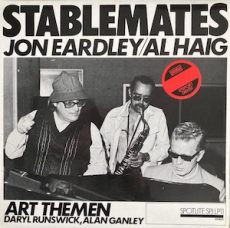
Requisites
Stablemates ~ Jon Eardley and Al Haig | By Eddie Carter
You really know your godchildren truly care and love you when they surprise you for your birthday with an album by two artists whose music you’re aware of, yet whose records have never found a place in your library. This morning’s spotlight shines on flugelhorn and trumpet player Jon Eardley, who was passing through London on a brief 1977 tour and pianist Al Haig, who was in town to visit friends. The two musicians seized the moment to head into the studio to record their only album together, Stablemates (Spotlite Records SPJ LP11). It was released two years later, and rounding out the ensemble are Art Themen on tenor sax, Daryl Runswick on bass, and Alan Ganley on drums. My copy of this album is the 1979 U.K. stereo release.
The first side opener, Tangerine by Johnny Mercer and Victor Schertzinger, begins with Al’s upbeat piano intro to Jon’s lively melody. Art kicks off the opening solo briskly, then Al flows smoothly into the following reading. Jon entersnext with a strong, assertive tone. Art and Jon share a final conversation leading back to the theme’s reprise and close. Speak Low by Ogden Nash and Kurt Weill raises the temperature with the quintet’s swinging melody. Themen opens the solos with an inspired improvisation that sets the tone. Eardley follows with plenty of bounce and effervescence on the second statement. Themen is off to the races next with impeccable precision, then Runswick and Ganley engage in a spirited exchange until the theme’s restatement fades out.
‘Round Midnight by Bernie Hanighen, Thelonious Monk and Cootie Williams is a quartet showcase that opens with Al and Daryl’s pensive introduction ahead of Jon’s tender melody. Al begins the opening solo with dreamlike softness, then the pace moves upward slightly for Jon’s elegant interpretation before the ensemble’s gentle ending. The second side gets underway with the pianist’s soothing introduction to Embraceable You by George and Ira Gershwin. Eardley states the gentle melody with Themen. In the first solo, Haig offers a tender, thoughtful statement with a soft touch of elegant beauty. Eardley truly shines in the closing reading with notes so deeply heartfelt that it’s bound to move you to tears, leading to Themen’s closing chorus and a gentle climax.
Don’t Blame Me by Dorothy Fields and Jimmy McHugh receives a gorgeous treatment by the quintet, beginning with Jon’s slow-paced theme that radiates inviting warmth, and Art’s perfectly placed inserts. Al leads off, skillfully blending composure and gentleness, before Art continues this lovely standard with a solo that truly touches the spirit. Jon delivers an exquisitely soft, poignant horn passage preceding the theme’s return. The beat moves upward on final time for Eardley’s theme to Love Walked In by George and Ira Gershwin. Themen opens the solos with an energetic drive, then Haig contributes a robust interpretation. Eardley matches the intensity with swift execution, and Ganley and Runswick meet on common ground in the closer, leading to the theme’s reprise and climax.
Tony Williams produced the album, and Steve Waldman served as the recording engineer. It delivers an exceptional soundstage, as though the ensemble is performing live in your listening room. The mix is impressively balanced, offering remarkable clarity and fidelity from your speakers. Stablemates is one of six albums Jon Eardley led as a leader, and he contributed as a sideman on ten additional records. Al Haig, meanwhile, led twenty-five albums and played as a sideman on eight more. If you haven’t yet experienced the artistry of Jon Eardley or Al Haig, I highly encourage you to seek out Stablemates on your next search for great jazz records. This outstanding album invites fresh appreciation with each play and remains as relevant today as it was over forty years ago!
~ Don’t Blame Me, Embraceable You, Love Walked In, ‘Round Midnight, Speak Low, Tangerine – Source: JazzStandards.com
© 2025 by Edward Thomas CarterMore Posts: choice,classic,collectible,collector,history,instrumental,jazz,music,piano,trumpet
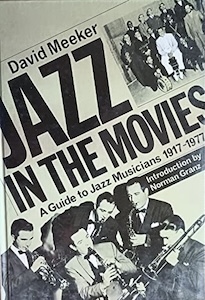
On The Bookshelf
Jazz In The Movies: A Guide to Jazz Musicians 1917~1977 by David Meeker is the result of ten years research into the arena of jazz and the film industry. Norman Granz, who penned the introduction, writes of David as one of the small, dedicated, diligent, extremely hard-working, enthusiastic group of people that the world luckily possesses.
The idea for the book came to Meeker some twenty years before its writing after waiting for a prolonged and disappointing time of news reels, travelogues and the like to watch a film titled The Three Little Bops and to finally hear the sweet sounds of Shorty Rogers. Then he thought why has there been no jazz filmography produced. So, he set about the daunting task of compiling 2,500 movies and this is the outcome.
The book lists each film title alphabetically, together with its nationality, year of production, director, running time, a short critique and details of all jazz artists, band personnel and musical items where known.
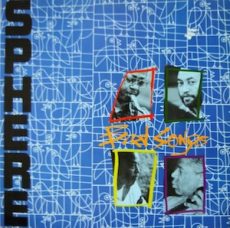
Requisites
Bird Songs ~ Sphere | By Eddie Carter
Sphere initially came together to celebrate the music of Thelonious Monk; however, the quartet soon expanded its repertoire to include original albums as well. I first heard “I Didn’t Know What Time It Was” on WNOP, Cincinnati’s then-jazz station, and I immediately purchased the album right after work. Listening to it again a few nights ago inspired me to share my thoughts this morning. Bird Songs (Verve Digital 837 032-1), the quartet’s sixth release, is an excellent showcase of the underrated artistry of tenor saxophonist Charlie Rouse. Also on board are Kenny Barron on piano, Buster Williams on bass, and Ben Riley on drums, as the quartet celebrates the legacy of Charlie Parker. My copy of this album is the 1988 U.S. digital stereo release.
Side One opens with the quartet’s introduction and theme to Red Cross. Kenny sparkles with inventive runs and unexpected turns in the opening statement. Charlie follows, paying homage to Bird’s rhythmic playfulness, driven by Buster and Riley’s groundwork into the group’s rousing closing chorus. I Didn’t Know What Time It Was by Richard Rodgers and Lorenz Hart is a beloved jazz standard that was a staple in Parker’s repertoire. Williams and the rhythm section set the scene elegantly. Rouse enters next with a smoky, reflective melody, before taking flight in the first solo. The trio’s brief, tasteful interlude clears the way for Barron’s swinging interpretation. After a second trio interlude nudges the tempo forward, Rouse returns for the reprise, and the song gently fades out with the trio’s subtle touch.
The ensemble moves into Dewey Square next, with the rhythm section’s introduction paving the way for Charlie todeliver the melody. Buster begins the solos with a delightfully spirited walk, then Charlie steps into the second statement with a passionately frisky tone that’s crisp, well-structured and executed vivaciously. Kenny tackles the closing reading with youthful zest that’s right on the beat. Ben adds a concise comment during the theme’s reprise and exit. Moose The Mooche shifts the energy upward to begin Side Two with the quartet’s brisk introduction and theme. Rouse fires off the first solo with an infectiously cheerful solo. Barron leaves a memorable mark in the second reading, then Riley takes the spotlight next with youthful vigor. Barron places a few inserts during the theme’s restatement.
Barbados showcases Parker’s take on the calypso rhythm, infused with a bebop twist. The quartet’s melody is joyous, setting the stage for Charlie’s opening solo, which captures the tune’s Caribbean sunlight. Buster walks with a buoyant swagger next, then Kenny weaves a zesty spell with uplifting confidence. Ben evokes the gentle ebb and flow of island waves, carrying the quartet to the closing chorus. The ensemble’s brisk, buoyant introduction to Ah-Leu-Cha leads to an exuberant melody. Rouse draws on his robust tone and melodic inventiveness in the first solo. Barron opens the following reading with playful fragments derived from the central theme. Williams steps forward last, threading a stream of flawlessly constructed musical thoughts until the quartet reconvenes for the melody’s return and climax.
The album’s closer, Quasimodo, slows the pace one final time, for the group’s medium theme. First up is Kenny, who unfolds his solo gradually, with lines marked by crisp articulation and a deft touch. The baton then passes to Charlie, who enters with a relaxed warmth and expressiveness. He listens and responds to the rhythm section, ahead of the theme’s restatement and finale. Joanne Klein and Sphere produced the album, with Richard Seidel serving as executive producer. Rudy Van Gelder was behind the recording dials, and the album was recorded directly to two-track digital using the Sony 3402 DASH Reel-to-Reel Recorder. The album’s sound quality possesses a superb soundstage that emerges from your speakers as if the musicians are positioned directly in front of your sweet spot.
Bird Songs was the final recording Charlie Rouse made with the quartet, as he sadly passed away from lung cancer eight months later, on November 30, 1988, at the age of 64. The ensemble delivers a tight and cohesive performance throughout, and this is truly one of those thoughtfully crafted sessions that invites listeners to return again and again. For anyone who treasures bebop, I enthusiastically suggest adding Bird Songs by Sphere to your library during your next visit to the record store. The album serves as a stirring homage to Charlie Parker, with four remarkable musicians breathing new life into his legacy, creating an experience rich in pure joy, surprise, and profound artistry!
~ I Didn’t Know What Time It Was – Source: JazzStandards.com
~ Postscript Excerpt: DASH – The Digital Audio Stationary Head standard is a reel-to-reel digital audio tape format introduced by Sony in early 1982 for high-quality multitrack studio recording and mastering, as an alternative to analog recording methods. Source: Wikipedia.org
© 2025 by Edward Thomas Carter
More Posts: bass,choice,classic,collectible,collector,drums,history,instrumental,jazz,music,piano,saxophone



